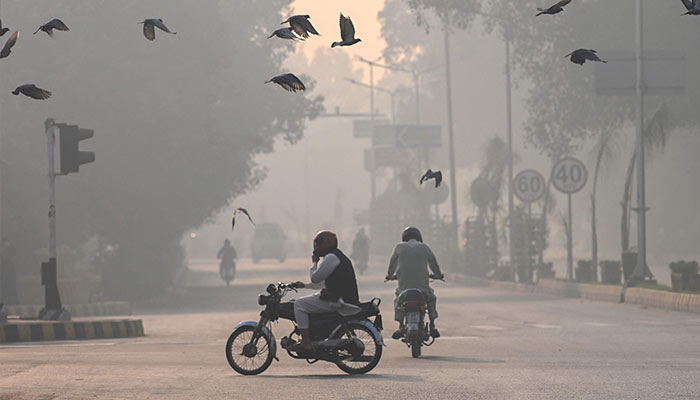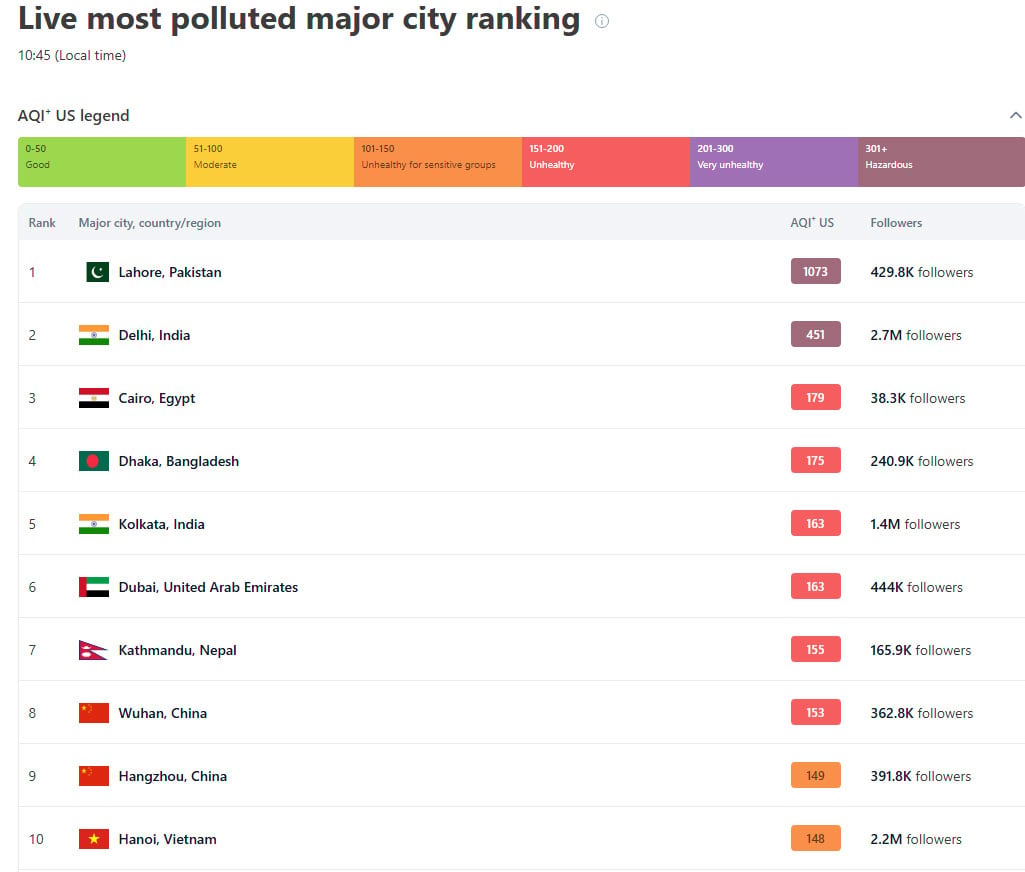Lahore AQI surges past 1,000 again with citizens struggling under suffocating smog
Air quality in Punjab capital "hazardous" as thick smog persists despite government's action to combat pollution
The Punjab authorities struggle to bring the smog levels down in Lahore as the city topped the global pollution charts on Sunday, with an even higher air quality index (AQI), indicating alarming situation in the provincial capital.
Residents continue to suffer under "hazardous" air quality as Lahore's AQI surpassed 1,000 mark on the real-time list of world's most polluted cities by Swiss pollution monitor.
The AQI, which measures a range of pollutants, spiked to 1,073 on the IQAir's list at 10:45am.
Meanwhile, the level of fatal PM2.5 pollutants — the small particulate matter in the air that inflicts immense harm to health — was at 613, which is 122.6 times higher than the World Health Organisation's (WHO) hazardous threshold.
At one point, the AQI reached 1,194 before dipping down to 766 by the noon.
Thick smog shrouding the megapolis also reduced the visibility to zero as the Punjab government failed to bring down the pollution levels.
An environmental expert reiterated the advise that the citizens should avoid going out of their homes without masks, and keep themselves hydrated besides washing face in short intervals.
For days, the city of 14 million people has been affected by smog mix of fog and pollutants caused by low-grade diesel fumes, smoke from seasonal agricultural burning and cooler temperatures.
On Saturday, the AQI in Lahore surged to 1,067, an "unprecedented" level according to a senior government official.
The city battles smog each year in winter. Seasonal crop burn-off by farmers on the outskirts of Lahore also contributes to toxic air, which according to the WHO, can cause strokes, heart disease, lung cancer besides respiratory diseases.
Pollution-led smog in the city is causing serious problems for residents, especially those who work outdoors. Citizens toiling in polluted air have reported breathing difficulties, coughing and burning eyes, affecting both their health and productivity.
The Punjab government has been scrambling to reduce the pollution with multiple actions, and has renewed the smog alert, warning citizens of injurious effects of persisting bad air quality on health.
To fight off smog, authorities have imposed a "Green Lockdown" in the most polluted zones of Lahore, completely banning construction activities, entrance of "Qingqi motorcycle-rickshaws", operation of commercial generators, open food cooking points and food outlets using charcoal, coal or wood without installation of proper emission control system.
The government has also introduced mandatory mask-wearing and restricted outdoor activities, including school assemblies and playtime to keep the citizens safe from severe smog.
Meanwhile, the transport department is continuing crackdown on the vehicles causing environmental pollution.
However, the measures appear ineffective in mitigating the impact of smog as its continues to rise across Punjab, causing a sharp deterioration in air quality.
The central and southern regions of the province were also engulfed in harmful smog.
The Pakistan Meteorological Department (PMD) has said that Multan, Sialkot, Narowal, Gujranwala, Sheikhupura, Jhang, Bahawalpur, and Dera Ghazi Khan will experience the smog, with mainly dry weather in most districts of Punjab.
Punjab's Senior Minister Marriyum Aurangzeb, who holds multiple portfolios including environment protection and climate change, said that the cities adjoining Lahore and Indian capital, New Delhi are being affected due to the change of wind direction.
She stressed on strict adherence to the guidelines defined by the experts to stay safe from the effects of air pollution.
Punjab's Environmental Protection Department spokesperson said that the smoke-laden air from neighbouring India is contributing to increase in smog levels.
Delhi also reels under intensifying smog, mostly as the second most polluted city on the IQAir's list. It retained its position today as well with an AQI of 511 around 10am.
India has called for collaboration and regional cooperation in South Asia to tackle the deteriorating air pollution dilemma after Punjab Chief Minister Maryam Nawaz floated the idea of engaging in diplomatic efforts with the neighbouring country.
-
Security forces gun down 30 terrorists in multiple IBOs in KP: ISPR
-
MQM-P calls for new province in Sindh
-
US report validates Pakistan military edge over India: PM
-
Banned TTP poses serious threat to Pakistan security: UNSC panel
-
CM Afridi clarifies remarks on by-poll after ECP requests army deployment
-
Dubai sees 3.2m Pakistani passengers in 2025 as airport sets new milestone
-
Security forces kill 23 Indian proxy terrorists in KP's Kurram
-
Pakistan to construct island to boost oil exploration: report













